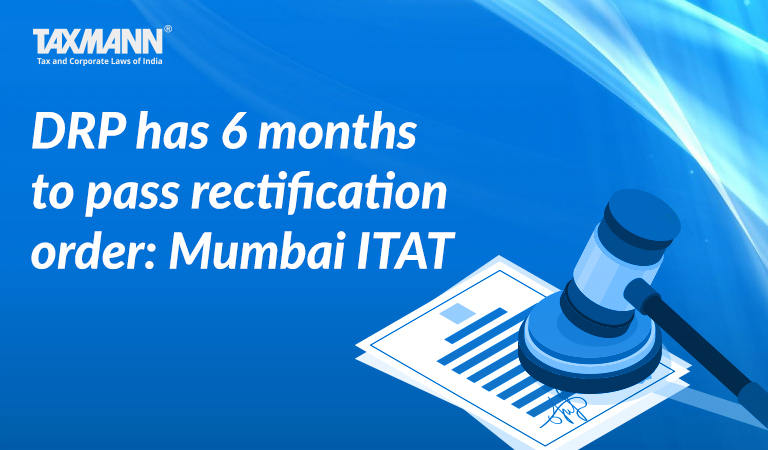DRP has 6 months to pass rectification order: Mumbai ITAT
- Blog|News|Transfer Pricing|
- 2 Min Read
- By Taxmann
- |
- Last Updated on 20 October, 2022

Case Details: Michael Page International Recruitment (P.) Ltd. v. DCIT - [2022] 143 taxmann.com 253 (Mumbai-Trib.)
Judiciary and Counsel Details
-
- Pramod Kumar, Vice-President & Sandeep S. Karhail, Judicial Member
- Dhanesh Bafna & Pratik Shah for the Appellant.
- Vatsala Jha & Chetan M. Kacha for the Respondent.
Facts of the Case
In the instant case, on account of a word-processing cut-paste error, the Dispute Resolution Panel (DRP) in its order, incorporated directions relating to another group concern. The Assessing Officer (AO) incorporated such incorrect directions and passed the assessment order.
Within a month, the DRP detected the mistake and a rectification order was passed. However, no effect to this rectification order was given by AO. The aggrieved assessee filed the instant appeal before the Mumbai Tribunal.
The assessee contended that AO should have applied his mind before passing the order as directions issued by DRP weren’t relatable to the assessee’s facts. Thus, the order should be quashed. Further, the rectification order passed by DRP was beyond the time permissible under section 144C(12). Even if it was considered in time, the AO should have implemented rectified order within one month.
ITAT Held
The Mumbai Tribunal held that Section 144C(13) enjoins the AO to complete the assessment in conformity with the directions issued by DRP. It is not open to him to hold, giving effect to these directions, even if he finds the same to be prima facie incorrect.
Thus, whatever has been directed by the DRP is to be implemented within the permitted time limit; if there are mistakes in the directions of the DRP, that rectification can only be done by the DRP itself.
It is true that rule 13 of the Income-tax (Dispute Resolution Panel) Rules, 2009 doesn’t provide a time limit for rectification of mistakes. However, the Tribunal sees no reason to hold that the time limit permitted to the DRP for the rectification of mistakes apparent on record should be any less than the time permitted to the ITAT for the rectification of mistakes apparent on the record.
Accordingly, any order passed under rule 13 of the DRP rules cannot be held as barred by limitation if it is passed within six months from the end of the month in which the order was passed.
Further, as regards the time frame within which such a rectification order is to be given effect, While the time limit for implementing directions under rule 10, read with section 144C(5), is governed by Section 144C(13), the time limit for “rectification of mistakes” for which specific provisions are set out in Section 154 and is governed by the provisions of Section 154 itself.
Therefore, the AO has powers under section 154 to rectify the assessment order within 4 years from the end of the financial year in which the assessment order was passed.
Disclaimer: The content/information published on the website is only for general information of the user and shall not be construed as legal advice. While the Taxmann has exercised reasonable efforts to ensure the veracity of information/content published, Taxmann shall be under no liability in any manner whatsoever for incorrect information, if any.

Taxmann Publications has a dedicated in-house Research & Editorial Team. This team consists of a team of Chartered Accountants, Company Secretaries, and Lawyers. This team works under the guidance and supervision of editor-in-chief Mr Rakesh Bhargava.
The Research and Editorial Team is responsible for developing reliable and accurate content for the readers. The team follows the six-sigma approach to achieve the benchmark of zero error in its publications and research platforms. The team ensures that the following publication guidelines are thoroughly followed while developing the content:
- The statutory material is obtained only from the authorized and reliable sources
- All the latest developments in the judicial and legislative fields are covered
- Prepare the analytical write-ups on current, controversial, and important issues to help the readers to understand the concept and its implications
- Every content published by Taxmann is complete, accurate and lucid
- All evidence-based statements are supported with proper reference to Section, Circular No., Notification No. or citations
- The golden rules of grammar, style and consistency are thoroughly followed
- Font and size that’s easy to read and remain consistent across all imprint and digital publications are applied



 CA | CS | CMA
CA | CS | CMA
